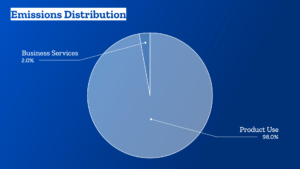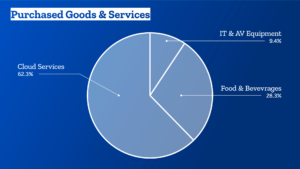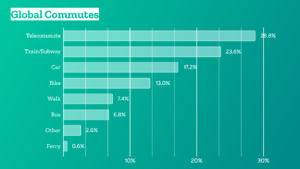When we launched our Environmental Sustainability Programme in March 2020, we identified three strategic goals:
- Reduce and mitigate Mozilla’s organisational impact;
- Train and develop Mozilla staff to build with sustainability in mind;
- Raise awareness for sustainability, internally and externally.
Today, we are releasing our baseline Greenhouse Gas emissions (GHG) assessment for 2019, which forms the basis upon which we will build to reduce and mitigate Mozilla’s organisational impact.
GHG Inventory: Summary of Findings
Mozilla’s overall emissions in 2019 amounted to: 799,696 mtCO2e (metric tons of carbon dioxide equivalent).
-
- Business Services and Operations: 14,222 mtCO2e
- Purchased goods and services: 8,654 mtCO2e
- Business travel: 2,657 mtCO2e
- Events: 1,199 mtCO2e
- Offices and co-locations: 1,195 mtCO2e
- Remotees: 194 mtCO2e
- Commute: 147 mtCO2e
- Product use: 785,474 mtCO2e
- Business Services and Operations: 14,222 mtCO2e
How to read these emissions
There are two major buckets:
- Mozilla’s impact in terms of business services and operations, which we calculated with as much primary data as possible;
- The impact of the use of our products, which makes up roughly 98% of our overall emissions.
In 2019, the use of products spanned Firefox Desktop and Mobile, Pocket, and Hubs.
Their impact is significant, and it is an approximation. We can’t yet really measure the energy required to run and use our products specifically. Instead, we are estimating how much power is required to use the devices needed to access our products for the time that we know people spent on our products. In other words, we estimate the impact of desktop computers, laptops, tablets, or phones while being online overall.
For now, this helps us get a sense of the impact the internet is having on the environment. Going forward, we need to figure out how to reduce that share while continuing to grow and make the web open and accessible to all.
The emissions related to our business services and operations cover all other categories from the GHG protocol that are applicable to Mozilla.
For 2019, this includes 10 offices and 6 co-locations, purchased goods and services, events that we either host or run, all of our commercial travel including air, rail, ground transportation, and hotels, as well as estimates of the impact of our remote workforce and the commute of our office employees, which we gathered through an internal survey.
How we look at this data
- It’s easy to lose sight of all the work we’ve got to do to reduce our business services and operations emissions, if we only look at the overarching distribution of our emissions:

- If we zoom in on our business services and operations emissions, we’ll note that our average emissions per employee are: 12 mtCO2e.
- There is no doubt plenty of room for improvement. Our biggest area for improvement will likely be the Purchased Goods and Services category. Think: more local and sustainable sourcing, switching to vendors with ambitious climate targets and implementation plans, prolonging renewal cycles, and more.

- In addition, we need to significantly increase the amount of renewable energy we procure for Mozilla spaces, which in 2019 was at: 27%.
- And while a majority of Mozillians already opt for a low-carbon commute, we’ll explore additional incentives here, too:

- We will also look at our travel and event policies to determine where we add the most value, which trip is really necessary, how we can improve virtual participation, and where we have space for more local engagement.
You can find the longform, technical report in PDF format here.
We’ll be sharing more about what we learned from our first GHG assessment, how we’re planning to improve and mitigate our impact soon. Until then, please reach out to the team should you have any questions at sustainability@mozilla.com.

























